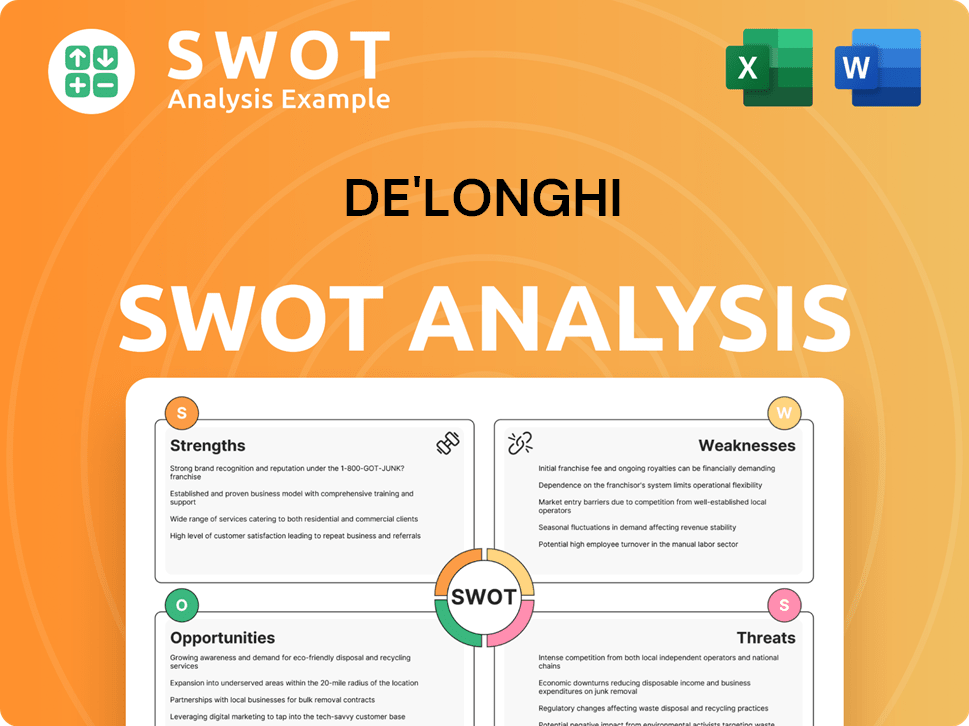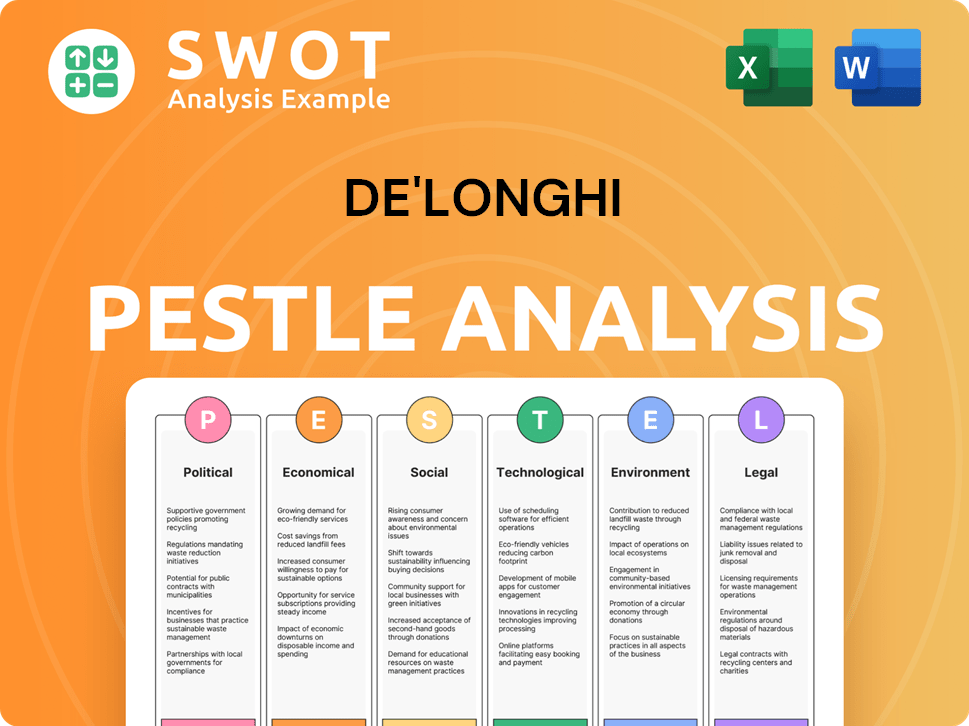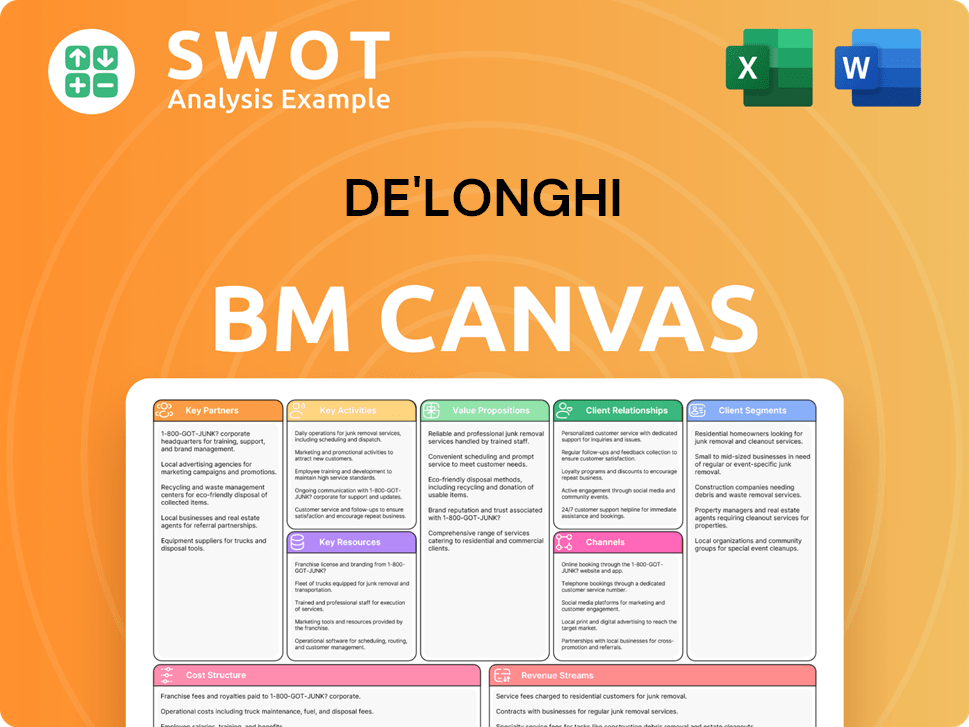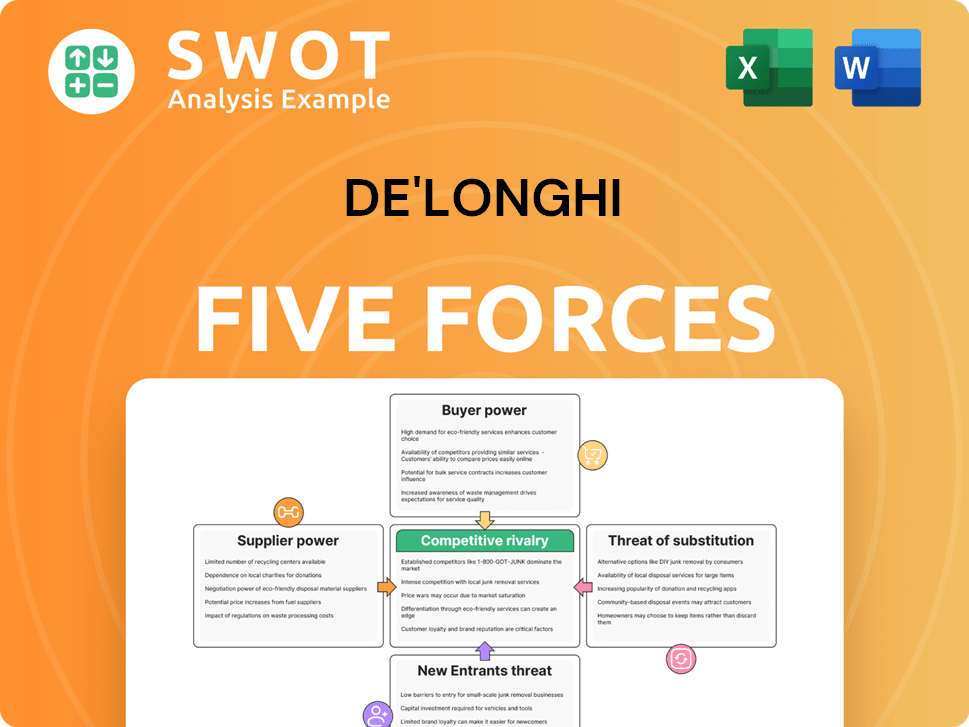De'Longhi Bundle
Can De'Longhi Maintain Its Edge in the Cutthroat Appliance Market?
De'Longhi, a name synonymous with premium espresso machines and stylish home appliances, faces a dynamic and fiercely competitive landscape. From its Italian roots in 1902, the company has evolved into a global powerhouse, but what does the future hold for this iconic brand? This analysis dives deep into the De'Longhi SWOT Analysis, providing a comprehensive look at its rivals and strategic positioning.

Understanding the De'Longhi competitive landscape is crucial for investors, analysts, and anyone interested in the coffee machine market and broader small appliance brands. This report offers a detailed De'Longhi market analysis, identifying key De'Longhi competitors and dissecting the factors that drive its success. We'll explore the competitive advantages of De'Longhi and assess its position in the global market, providing insights into its future prospects.
Where Does De'Longhi’ Stand in the Current Market?
De'Longhi S.p.A. maintains a significant market position in the global small appliance sector, particularly in the coffee machine and climate control segments. The company is a recognized leader in espresso machines, especially in the premium and super-automatic categories. The Brief History of De'Longhi highlights its evolution and strategic focus.
In 2023, the De'Longhi Group reported revenues of €3,005.6 million, demonstrating its substantial scale within the industry. Its core product lines include coffee machines (espresso, drip, and fully automatic), kitchen appliances, and climate control solutions. De'Longhi has successfully adapted to evolving consumer preferences, offering technologically advanced and design-centric products, especially in the premium coffee machine market.
Geographically, De'Longhi has a strong presence across Europe, North America, and Asia-Pacific. The company has strategically expanded its reach, adapting its product offerings to cater to diverse regional preferences. De'Longhi's financial health remains strong, with a net profit of €251.6 million in 2023. The company continues to invest in research and development to maintain its competitive edge, particularly in markets with a strong coffee culture, such as Italy and other European countries. De'Longhi is actively expanding its footprint in emerging markets.
De'Longhi holds a leading position in the espresso machine industry, particularly in the premium and super-automatic segments. While precise market share figures for 2024-2025 are proprietary, the company's consistent recognition as a leader underscores its strong market presence. Its focus on innovation and design contributes to its competitive advantage.
In 2023, De'Longhi generated €3,005.6 million in revenue, demonstrating its financial strength. A net profit of €251.6 million in the same year highlights its profitability. The company's financial performance supports its ongoing investments in research and development and market expansion.
De'Longhi has a strong presence across Europe, North America, and Asia-Pacific. The company strategically adapts its product offerings to suit regional preferences. This global presence supports its overall market position and revenue generation.
De'Longhi's product portfolio includes a comprehensive range of coffee machines, kitchen appliances, and climate control solutions. The company's focus on innovation and design, especially in the coffee machine market, helps it maintain a competitive edge. This diversified product range caters to various consumer needs.
De'Longhi's competitive advantages include its strong brand reputation, innovative product offerings, and global distribution network. The company's focus on premium products and design allows it to capture a higher-value customer segment. De'Longhi's strategic investments in research and development support its ability to introduce new and improved products.
- Strong brand recognition in the espresso machine industry.
- A diversified product portfolio that includes coffee machines, kitchen appliances, and climate control solutions.
- Strategic geographic presence across Europe, North America, and Asia-Pacific.
- Consistent financial performance, including strong revenue and profitability.
De'Longhi SWOT Analysis
- Complete SWOT Breakdown
- Fully Customizable
- Editable in Excel & Word
- Professional Formatting
- Investor-Ready Format

Who Are the Main Competitors Challenging De'Longhi?
The Revenue Streams & Business Model of De'Longhi relies on a diverse product portfolio and global market presence. The company generates revenue primarily through the sale of its small appliances, including coffee machines, climate control products, and kitchen appliances. De'Longhi's monetization strategy focuses on premium pricing, brand reputation, and expanding its market share in key regions.
De'Longhi's financial performance is influenced by its ability to innovate and adapt to changing consumer preferences. The company's revenue is geographically diversified, with significant contributions from Europe, North America, and Asia-Pacific. De'Longhi's success depends on effective marketing, distribution, and maintaining strong relationships with retailers and distributors.
The competitive landscape for De'Longhi is dynamic, with various players vying for market share. Understanding the key competitors and their strategies is crucial for De'Longhi to maintain its market position and achieve sustainable growth. The following sections provide a detailed analysis of De'Longhi's main rivals in different product categories.
The coffee machine market is highly competitive, with several established brands competing with De'Longhi. Key players include JURA, Breville, Philips, and Nespresso. These competitors employ different strategies to capture market share, from focusing on premium features to leveraging brand recognition.
JURA, a Swiss company, specializes in high-end automatic coffee machines. They directly compete with De'Longhi in the premium segment. JURA’s focus is on technological sophistication and minimalist design, appealing to consumers willing to pay a premium for quality and innovation.
Breville, an Australian manufacturer, offers a wide range of kitchen appliances, including espresso machines. They are known for innovative features and user-friendly designs. Breville often targets a broader consumer base with products that balance performance and ease of use.
Philips competes with its extensive range of coffee makers and other small kitchen appliances. They leverage strong brand recognition and a broad distribution network. Philips often offers a balance of features and affordability, catering to a wide range of consumers.
Nespresso, a subsidiary of Nestlé, dominates the single-serve coffee machine market. They offer a convenient and branded coffee experience. Nespresso indirectly competes with De'Longhi's traditional espresso machines by providing an alternative coffee solution.
In the climate control segment, De'Longhi faces competition from brands like Honeywell, Dyson, and LG. These companies offer products such as portable air conditioners, heaters, and air purifiers. The competition focuses on features, design, and energy efficiency.
Beyond the direct competitors, emerging players in the smart home appliance sector and private label brands also present a challenge. The market has seen consolidation through mergers and acquisitions, impacting the competitive landscape. These factors require continuous innovation and differentiation from De'Longhi.
- Honeywell: Offers a wide range of home comfort products, including portable air conditioners and heaters, focusing on smart features and energy efficiency.
- Dyson: Known for innovative and premium home appliances, Dyson competes in the air treatment space with fan heaters and air purifiers, emphasizing design and advanced technology.
- LG: A South Korean conglomerate with a broad portfolio of electronics and home appliances, including air conditioners and dehumidifiers, leveraging global manufacturing capabilities.
- Emerging Players and Private Labels: These competitors often use aggressive pricing strategies and integrated smart home ecosystems.
- Market Consolidation: Mergers and acquisitions continue to reshape the market, pushing companies to innovate and differentiate.
De'Longhi PESTLE Analysis
- Covers All 6 PESTLE Categories
- No Research Needed – Save Hours of Work
- Built by Experts, Trusted by Consultants
- Instant Download, Ready to Use
- 100% Editable, Fully Customizable

What Gives De'Longhi a Competitive Edge Over Its Rivals?
Understanding the De'Longhi competitive landscape involves recognizing its key advantages. The company has carved a strong niche in the coffee machine market and small appliance sector. Its success stems from a blend of brand strength, innovative design, and a global distribution network.
De'Longhi's 'Made in Italy' heritage enhances its brand image, especially in the premium segment. This perception of quality and style is crucial for customer loyalty and premium pricing. Furthermore, the company continuously invests in research and development to introduce advanced features in its products.
A deep dive into De'Longhi's market analysis reveals its competitive edge. The company's focus on innovation, combined with its strong brand reputation, allows it to maintain a leading position. This approach ensures it can adapt to market changes and consumer preferences effectively.
De'Longhi benefits from its 'Made in Italy' branding, which signals quality and craftsmanship. This heritage allows the company to command premium prices and build strong customer loyalty. This is a key factor in the De'Longhi competitive landscape.
The company's investment in research and development is a continuous source of innovation. De'Longhi holds numerous patents, particularly related to its coffee machine technology. This includes features like the LatteCrema system, which enhances the user experience and product value.
De'Longhi has established a robust global distribution network, including retail partnerships and online sales channels. This extensive reach ensures broad market access and supports its global market presence. The company's ability to reach consumers worldwide is a significant advantage.
Through global manufacturing and procurement, De'Longhi achieves economies of scale. This allows it to offer competitive pricing while maintaining profitability. This cost advantage is crucial in the competitive espresso machine industry.
De'Longhi's competitive advantages are multifaceted, contributing to its strong market position. These advantages enable the company to differentiate itself from competitors and maintain a leading edge in the industry. For more insights, you can explore the Growth Strategy of De'Longhi.
- Strong brand equity and premium positioning.
- Continuous innovation and a portfolio of patents.
- Extensive global distribution network.
- Economies of scale and cost advantages.
De'Longhi Business Model Canvas
- Complete 9-Block Business Model Canvas
- Effortlessly Communicate Your Business Strategy
- Investor-Ready BMC Format
- 100% Editable and Customizable
- Clear and Structured Layout

What Industry Trends Are Reshaping De'Longhi’s Competitive Landscape?
The small appliance industry, including the De'Longhi competitive landscape, is currently experiencing significant shifts driven by technological advancements and evolving consumer preferences. These changes present both challenges and opportunities for companies like De'Longhi. The rise of smart home integration and a focus on sustainability are key trends shaping the market. For a deeper understanding, consider the perspectives of Owners & Shareholders of De'Longhi.
De'Longhi's market analysis reveals that the company faces increased competition from tech giants and agile startups, which could intensify pricing pressures. Supply chain disruptions and evolving consumer preferences also pose challenges. However, opportunities exist in emerging markets and through product innovation, particularly in areas like personalized beverage experiences and advanced air purification. The company's ability to adapt and innovate will be crucial for maintaining its market position.
Technological advancements, especially in smart home integration and AI, are driving demand for connected appliances. Consumers increasingly seek convenience, energy efficiency, and personalized experiences. Regulatory changes concerning energy consumption and environmental impact also influence product development, pushing companies to invest in more sustainable designs.
Increased competition from tech giants and startups could intensify pricing pressures. Supply chain disruptions pose a continuous threat to production and distribution. Evolving consumer preferences, such as a growing emphasis on sustainability and product longevity, require companies to adapt their manufacturing processes and material sourcing.
Significant opportunities exist in emerging markets where disposable incomes are rising and demand for household appliances is growing. Product innovation in personalized beverage experiences, advanced air purification, and integrated kitchen systems can further solidify market position. Strategic partnerships with technology companies or complementary brands could unlock new avenues for growth.
To remain resilient, De'Longhi is likely to continue its focus on premiumization, digital transformation, and expanding its direct-to-consumer channels. Adaptability and innovation are key. The global smart kitchen appliance market is projected to grow, indicating a strong trend towards connected devices, which De'Longhi can leverage.
De'Longhi's competitors in the coffee machine market and the broader small appliance sector include established brands and emerging players. The company must continually assess its competitive advantages and adapt to market dynamics. The espresso machine industry is particularly competitive, with innovation and brand reputation playing crucial roles.
- Innovation: Continuously develop new features and technologies in coffee machines and other appliances.
- Market Expansion: Focus on growth in emerging markets with rising disposable incomes.
- Sustainability: Integrate sustainable practices into manufacturing and product design.
- Digital Transformation: Enhance online presence and direct-to-consumer channels.
De'Longhi Porter's Five Forces Analysis
- Covers All 5 Competitive Forces in Detail
- Structured for Consultants, Students, and Founders
- 100% Editable in Microsoft Word & Excel
- Instant Digital Download – Use Immediately
- Compatible with Mac & PC – Fully Unlocked

Related Blogs
- What are Mission Vision & Core Values of De'Longhi Company?
- What is Growth Strategy and Future Prospects of De'Longhi Company?
- How Does De'Longhi Company Work?
- What is Sales and Marketing Strategy of De'Longhi Company?
- What is Brief History of De'Longhi Company?
- Who Owns De'Longhi Company?
- What is Customer Demographics and Target Market of De'Longhi Company?
Disclaimer
All information, articles, and product details provided on this website are for general informational and educational purposes only. We do not claim any ownership over, nor do we intend to infringe upon, any trademarks, copyrights, logos, brand names, or other intellectual property mentioned or depicted on this site. Such intellectual property remains the property of its respective owners, and any references here are made solely for identification or informational purposes, without implying any affiliation, endorsement, or partnership.
We make no representations or warranties, express or implied, regarding the accuracy, completeness, or suitability of any content or products presented. Nothing on this website should be construed as legal, tax, investment, financial, medical, or other professional advice. In addition, no part of this site—including articles or product references—constitutes a solicitation, recommendation, endorsement, advertisement, or offer to buy or sell any securities, franchises, or other financial instruments, particularly in jurisdictions where such activity would be unlawful.
All content is of a general nature and may not address the specific circumstances of any individual or entity. It is not a substitute for professional advice or services. Any actions you take based on the information provided here are strictly at your own risk. You accept full responsibility for any decisions or outcomes arising from your use of this website and agree to release us from any liability in connection with your use of, or reliance upon, the content or products found herein.